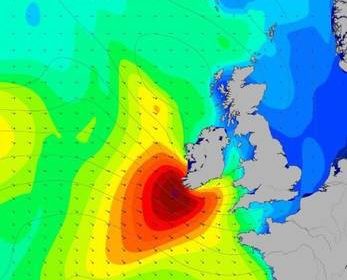Wilder weather and heat caused by climate change 'will bring a significant health risk'

Wilder weather and rising heat due to climate change will pose significant health risks for Ireland, including an increase in potentially fatal disease from 170,000 water wells.
Dr Ina Kelly, HSE public health specialist in the midlands, said Ireland is particularly vulnerable to the damaging effects of climate change, particularly due to the risk of contamination of drinking water from private wells.
Households depending on private wells can be left more at risk from a nasty form of E.coli, known as VTEC, which is already very high in Ireland.
“We have very significant vulnerabilities to climate change: for example, our susceptibility to serious water-borne disease from severe rainfall events is very high, with 170,000 private wells around the country providing untreated and sometimes contaminated drinking water,” she told the annual meeting of the Irish Medical Organisation in Killarney.
As the picturesque Co Kerry town was battered by Storm Hannah yesterday, she told the gathering of doctors that VTEC can claim the lives of 1pc of people who get the bug.
There have been 68 outbreaks in the last decade affecting 1,189 people, and around half are due to contaminated water. She warned Ireland doesn’t have a heatwave action plan and this is needed.
There are serious health consequences for some vulnerable people in extreme heat and there were scenes of unbearable suffering last summer, including the testimony of a patient who was in a hospital ward with no air conditioning.
“It appears that climate change will have four primary effects: more extreme weather, a change in precipitation levels, warmer weather and rising sea levels. These events in isolation may be very challenging; together, they could pose a potential climate disaster for many Irish people,” she said.
“It is good to see more emphasis on the environment, but up to now that emphasis has been on mitigation which is essential, but not enough.
“We need to move to an adaptive approach to secure our environment. If as we don’t, think about how many people will lose their houses and livelihoods, and the subsequent effect on their health. The effects could be monumental.”
Dr Kelly, a member of the Climate Change Advisory Council’s adaptation committee, said the health service also needs to adapt.
“Some of our hospital buildings are probably not fit for purpose even now, in terms of room temperature control and hygiene facilities,” she said.
“In the context of doctors leaving the country in their thousands, the future of healthcare is very concerning and greater focus is required on getting the basics right.”
Source: Read Full Article